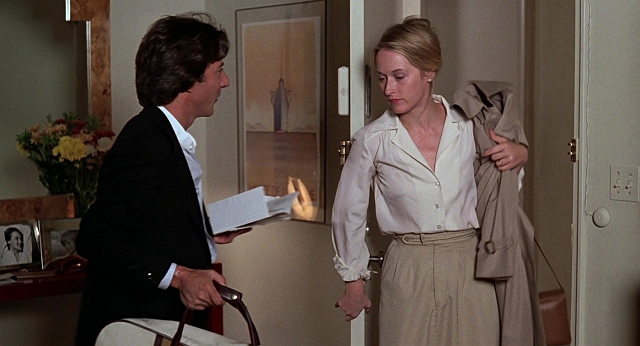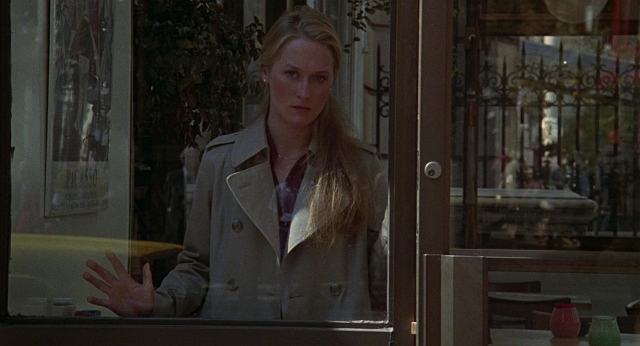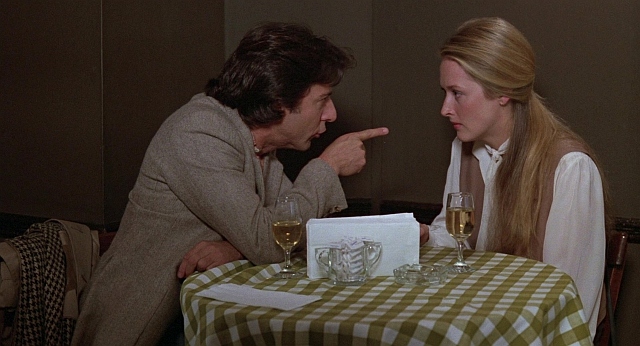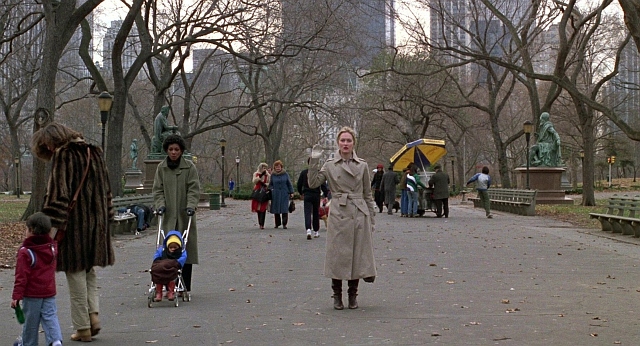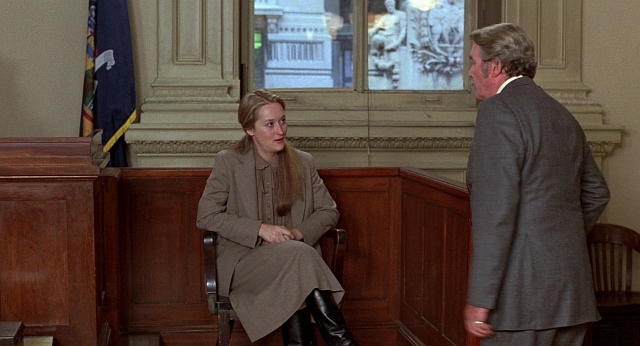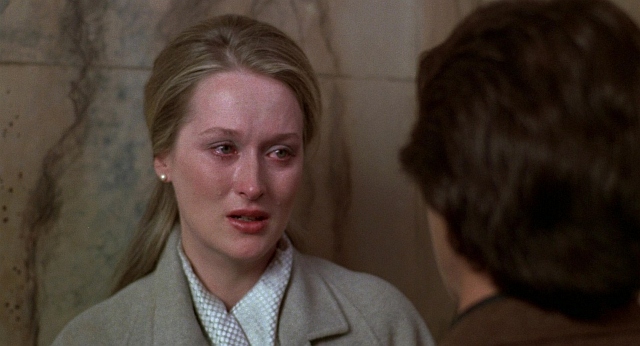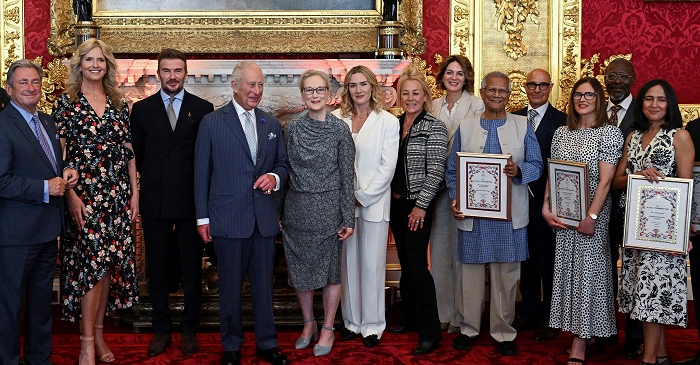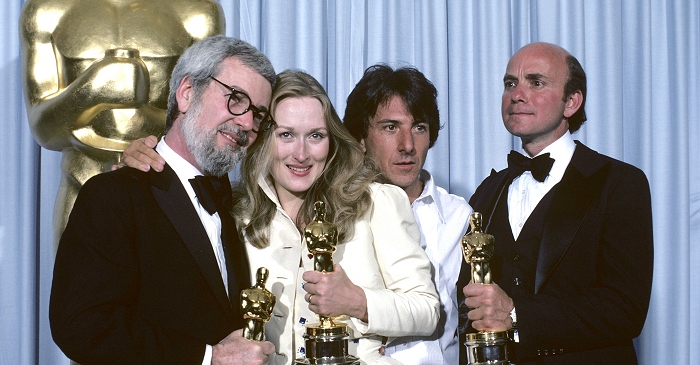|
Simply Streep is your premiere online resource on Meryl Streep's work on film, television and in the theatre - a career that has won her acclaim to be one of the world's greatest living actresses. Created in 1999, Simply Streep has built an extensive collection over the past 25 years to discover Miss Streep's body of work through thousands of photographs, articles and video clips. Enjoy your stay and check back soon.
|
Kramer vs. Kramer
December 19, 1979
· Columbia Pictures
· 105 minutes
|

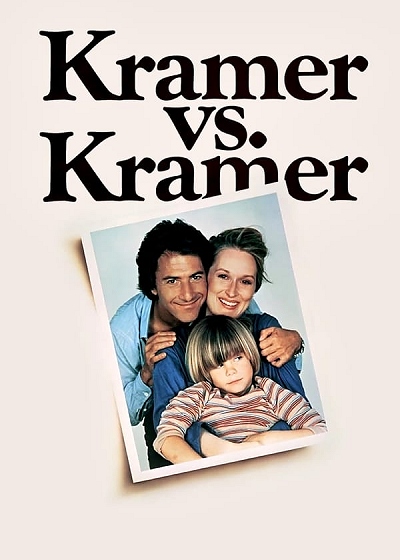
When the 52nd annual Academy Awards rolled around in April of 1980, it came as no surprise when Kramer vs. Kramer (1979) took home 5 Oscars including Best Picture, Best Director, Best Adapted Screenplay, Best Actor, and Best Supporting Actress – from its 9 total nominations. The film had already received several awards from such film societies as the LA Critics Association, New York Film Critics Circle, and many others. One of the biggest blockbusters of the year, it grossed over $70 million at the box-office, making it clear that both the critics and the public agreed. This simple, yet timely story of changing gender roles is one of the most sincere, emotionally stirring, and skillfully woven films ever made on a family torn apart by divorce. Ted Kramer (Dustin Hoffman), a New York advertising art director, comes home from work one evening to tell his wife and son that he has just had “one of the five best days of his life.” His career is on the fast track to success and his upper east-side family life seems picture-perfect. That same evening, his wife, Joanna (Meryl Streep), tells Ted that she is leaving him and their son (Justin Henry), to “find herself.” His life suddenly in disarray, Ted is forced to make some career sacrifices and focus on becoming the boy’s sole care-giver, a role that at first emphasizes the emotional divide between father and son. Eventually, the two grow close and reestablish themselves as a family when Joanna unexpectedly returns to claim her son, igniting a bitter custody battle.
I worked a week at the beginning and a week at the end. But (laughingly) they talk about me disparagingly for two hours! In 1979, nobody was talking about depression, but this woman probably thought about killing herself once or twice every day. I could understand the compulsion to leave and not want to take your little boy wherever you were going in order to get better. I didn’t think she was horrible – I read it and I was on her side. The ending never felt like and ending to me. Everyone said, ‘There! She gave the boy back!’ And I thought, ‘Yeah… that week’. You don’t know where the process of ger getting herself back together would lead. And you just know when the boy became preadolescent, he’d say ‘F– you, Dad! I’m gonna live with my Mom, a-hole! (Meryl Streep, Entertainment Weekly, March 2000)
Kramer vs. Kramer is based on the 1977 novel by Avery Corman and was adapted for the screen by Robert Benton. At first the film producers wanted the renowned Francois Truffaut to direct, but Benton insisted on being allowed to direct as well. The producers then agreed to let Benton make his directorial debut with Nestor Almendros as his cinematographer. A Cuban expatriate, Almendros had previously worked with Truffaut on several films and was added to the crew very early in production so that he had input on creative decisions. The resulting piece won Benton both Best Director and Best Adapted Screenplay Oscars and put him on the map as one of the most sought after writer/directors of the day.
The ending of Kramer vs. Kramer was reshot and improvised. Benton called me and he said the ending was fine, but he wanted another ending. In the original, we both went upstairs and saw our son, came downstairs and held him, and then went to the park. And we were just another family in the park. But he came up with the idea that she wakes up and realizes – though she won the court case – she wasn’t ready to take her child. It was the last moment, and we went into the elevator and she was supposed to look at me and I look at her. Well, we’d been shooting all day and mascara was running down her cheecks. By the time she got in the elevator (before the cameras rolled), she looked and me said, actor to actor, ‘How do I look?’ And Benton heard that and said, ‘That’s the ending of the movie’ (Dustin Hoffman, The Hollywood Reporter, April 14, 2008)
Originally the film’s producers wanted Kate Jackson from Charlie’s Angels for the part of the mother. They believed Streep would work best for Phyllis, the character JoBeth Williams ended up playing, because she had never carried a cinematic lead despite several popular theater and supporting film roles. “In their thinking, Meryl was not yet a bankable enough commodity to play Hoffman’s wife,” author Diana Maychick wrote in her biography, Meryl Streep. So Streep met with Benton and Hoffman to audition for the part of Phyllis four days after her wedding to sculptor Donald J. Gummer. Once they saw her, however, they thought she was absolutely perfect for the role of Joanna. Streep ended up rewriting most of her part to make her character more sympathetic, including her entire courtroom speech. She did “research” by reading women’s magazines and talking to her mother. Hoffman reportedly thought she was trying to upstage him and argued with her over many of the changes. Eventually though, she won him over and Joanna was made into a much more sympathetic and complex character. Hoffman later told Maychick, “Yes I hated her guts, but I respected her.” He realized that Streep “was not fighting for herself, but for the scene. She sticks with her guns and doesn’t let anyone mess with her when she thinks she’s right.” Streep’s performance earned her the Best Supporting Actress Oscar for that year her first Academy Award.
The greatest thing that can be said about “Kramer vs. Kramer” is that it stands the test of time. When I re-watched recently I was expecting it to have lost much of the relevancy which made it such a hit in 1979. You would think a film about a divorce is dated since pretty much everybody these days is divorced – but the film hasn’t lost any of its brilliance, sadness and currency throughout the years. Here we watch people from the real world, not one sentece seems scripted, no action seems forced. You care about Ted Kramer, although he’s a career-driven, selfish egomaniac. You care about Joanna, although she makes the heinous decision of leaving her child within the first few minutes you meet her. And you care about Billy, because he’s not the wise-cracking Hollywood kid who’s smart about everything. These characters grow with the film, they make decisions, they live, they fight for it. The power of “Kramer” lies within the brilliant script and the actors who portray the family – Dustin Hoffman, Meryl Streep and Justin Henry. This is a must-see, not only because Meryl delivers one of the best performances of her career in the limited screentime she has. It’s also a great example of exceptional filmmaking and storytelling. Very recommended.
★ Academy Award – Best Supporting Actress
★ Golden Globe Award – Best Supporting Actress
★ Los Angeles Film Critics Circle Award – Best Supporting Actress
★ National Board of Review – Best Supporting Actress
★ National Society of Film Critics Award – Best Supporting Actress
★ New York Film Critics Circle Award – Best Supporting Actress
☆ British Academy Award – Best Film Actress


